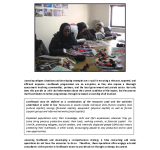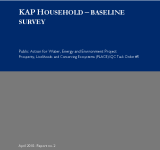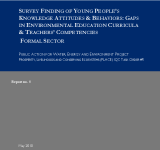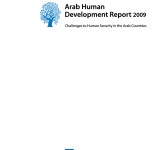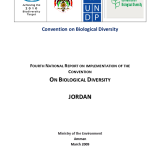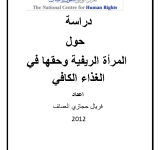resources
The report is based on the KAP household baseline survey;; which measures the current awareness of methods of water and energy conservations to determine how the Jordanians currently dispose of their household waste and how serious they believe the threat of global warming to be in Jordan. The household baseline survey on the use of water;; energy;; and the management of solid household waste has been designed based on the Knowledge;; Attitude and Practice (KAP) model;; and it aims to serve as a prelude to education and changing public behavior in the water and energy sectors in Jordan;; and to supply specific initiatives in the environment;; in particular in regard to the management of solid household waste. The research is based on a qualitative research;; a questionnaire and semi-structured interviews. The report concludes with the main findings that the most trusted sources of information on water conservation were the Ministry of Water and Irrigation;; and the Jordan Water Company. The survey finds that the respondents believe that the water shortage can be overcome with the water authorities' leadership including their engagement in grand projects.
The report aims to learn about young people's knowledge;; attitudes;; and behaviors with regards to water conservation;; energy conservation;; and waste management;; and it assess these against the learning objectives of the curriculum. It discovers that students' knowledge was sufficient and at times more sophisticated than that founded in the curriculum even though their attitudes and behaviors remain largely unchanged. The object of the survey pertains to the objectives of the Public Action for Water;; Energy;; and Environment Project;; which revolve around education for young people;; teachers and youth leaders to develop their knowledge and ethical values and attitudes. The survey focuses on assessing young people and educator's current awareness of water and energy resources and waste reduction and evaluating formal curriculum resources. The report points at the gap of translating young people's knowledge into genuine interest;; concern and action and proposes set of targeted actions including development of relevant resources and additional supplemental materials;; age-relevant projects to support environmental concepts in the national curriculum and assignment of environmental coordinator at all schools.
The fifth volume in the series of Arab Human Development Reports sponsored by the United Nations Development Programme and independently authored by intellectuals and scholars from Arab countries. The report argues that human security is a prerequisite for human development;; and that the widespread absence of human security in Arab countries undermines people's options.
This report was implemented by the Jordanian Ministry of Environment and is the forth national report on the implementation of the Convention on Biological Diversity. It provides an overview of biodiversity status;; trends and threats in Jordan;; current status of national biodiversity strategies and action plans and finally sectorial and cross-sectorial integration of biodiversity considerations in Jordan.
يكمن اﻟهدف اﻟﻌﺎم ﻣﻦ هذه الدراسة إلى توضيح واقع المرأة الريفية الأردنية وحقها في الغذاء ;; من خلال مدى موائمة التشريعات الوطنية في كفالة هذا الحق وموقفها من المواثيق الدولية الناظمة ;; ومدى كفالة حقوق المرأة الريفية في التعليم والعمل والصحة والضمان الاجتماعي والحماية الاجتماعية وواقع التمثيل للمرأة بشكل عام في التنظيمات السياسية والاجتماعية والجمعيات التقليدية الرسمية وغير التقليدية;; اضافة إلى تشخيص الأسباب التي تحول دون إعمال هذا الحق ودور الحكومة في التصدي لظاهرة الفقر والجوع التي تعاني منها النساء الريفيات من خلال الاستراتيجيات و البرامج والمشاريع والخطط الوطنية الهادفة الى تأمين الغذاء الكافي للمواطنيين كافة. اعتمدت الدراسة على اسلوب منهج المسح الاجتماعي باستخدام استبانة لجمع بيانات الدراسة وكانت العينة عشوائية (166) إمرأة ريفية من المناطق الريفية ومناطق جيوب الفقر في المملكة وكما تم تحليل بيانات الدراسة باستخدام برنامج التحليل الاحصائي SPSS. وقدمت الدراسة مجموعة من التوصيات التي تستدعي ضرورة العمل على زيادة الوعي لدى المراة الريفية وتطوير قدراتها وتمكينها اقتصادياً.
